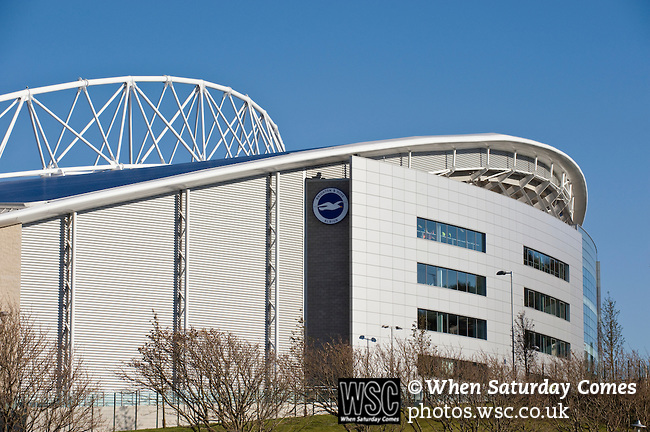Search: ' David Murray'
Stories
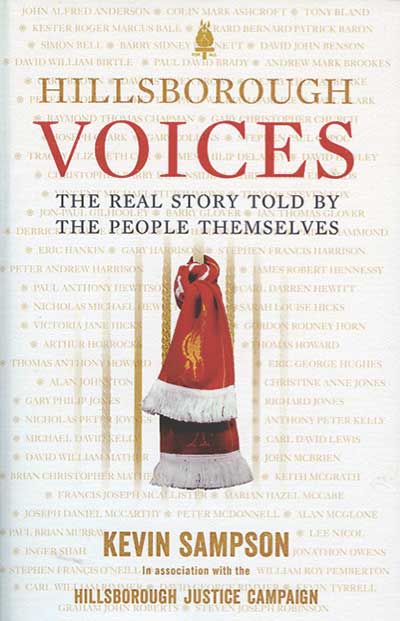 The real story told by the people themselves
The real story told by the people themselves
by Kevin Sampson
Ebury Press, £12.99
Reviewed by Rob Hughes
From WSC 353 July 2016
There are many horrific disclosures in the testimonies that make up this essential book. But perhaps the most shocking is that, of the 96 people who died at Hillsborough, as many as 58 could have survived had the correct medical procedures been in place. It’s a statistic that campaigner Sheila Coleman calls “obscene”. Compiled by Awaydays author Kevin Sampson in association with the Hillsborough Justice Campaign, Hillsborough Voices offers an unflinching account of the events of April 15, 1989 and its aftermath, from those who were there, those left bereaved and those who subsequently devoted their energies to the long struggle for truth and justice.
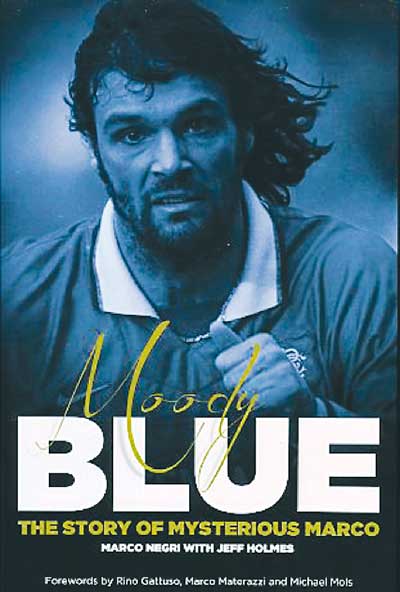 The story of the mysterious Marco
The story of the mysterious Marco
by Marco Negri with
Jeff Holmes
Pitch Publishing, £20
Reviewed by Jonathan O’Brien
From WSC 342 August 2015
Oleh Kuznetsov, Alan McLaren, Seb Rozental, Daniel Prodan: Rangers had more than their fair share of expensive crocks in the 1990s. But easily the strangest tale was that of Marco Negri, who started off as a superhuman goal-machine and ended up as a Winston Bogarde-like byword for lethargy as his contract slowly dribbled away. Moody Blue is his sporadically diverting attempt to set the record straight.
Readably ghostwritten by a Scottish journalist, Moody Blue is dominated by Negri’s time at Rangers, even though he only played 42 times for them. Signed by Walter Smith for £3.75 million along with several other Italians, his stats for the first half of 1997-98 were fairly special, even in a lopsided SPL. From August to December, he averaged more than a goal a game, scoring 33 times in 29 matches. Then it all abruptly ended when he suffered an eye injury during a game of squash with team-mate Sergio Porrini. Hospital treatment didn’t prevent him being out for months, and his irresistible momentum faded away overnight.
Moody Blue is good on the grotesque culture-clash stuff that characterises books by foreign imports in British football. On one occasion, Negri and Gennaro Gattuso decided to “eat like the Scots before a match, just once”. A few hours later, during the game, Gattuso found himself incapable of belching, and thus unable “to dislodge the rock inside our stomachs”. Negri also couldn’t get used to the uninterrupted flow of SPL matches, remarking that he played in games during which “the referee intervene[d] fewer than ten times”.
Negri got on well with Smith (until the end), but not with assistant coach Archie Knox, who he says picked on him in training. After Rangers were routed by IFK Gothenburg in a Champions League qualifier, Knox hairdryered him in the dressing-room in front of everyone: “Ten minutes of hell, as the attack was aimed especially at me.” To return to the belching theme, he also accuses Knox of often burping loudly while speaking, the polar opposite of Smith, who was apparently “always the epitome of elegance”.
Another nemesis was Ian Ferguson, who regularly addressed him as “fucking Italian”. The feeling was mutual. Negri nicknamed the midfielder “piedi di padella” – which meant pan-feet, or iron-feet, as I didn’t consider him a player of great class”. Lorenzo Amoruso was a much bigger enemy, “the type of person who would travel around the world so that it could see him”. Negri accuses the defender of meddling in his private life, and of backstabbing him by passing comments made in confidence on to the unamused Smith.
Negri doesn’t heap all the blame for his stop-stop career on others. Now 44, he admits that his 27-year-old self was bursting with “conceit and arrogance”. He scores just three goals in the second half of 1997-98, falls out with Smith over the manager’s “no beards or stubble” rule and, with zero interest in playing alongside Amoruso (whom he realises will be the captain for 1998-99), slides into a physical torpor. Rangers owner David Murray rings him at home one evening to resolve the situation, cops a mouthful of abuse – an incident which Negri recounts here with obvious mortification – and stops his wages there and then.
And that’s more or less that, apart from a loan spell at Vicenza, more injuries, three appearances in three years and a bizarre HIV scare after a blood test turns up some unexpected results. Fifteen minutes against Sturm Graz in October 2000, his only ever appearance in the Champions League, are how he signs off. “Looking back, I am proud of the career I made for myself,” he says near the end, though you wonder if he truly believes it himself.
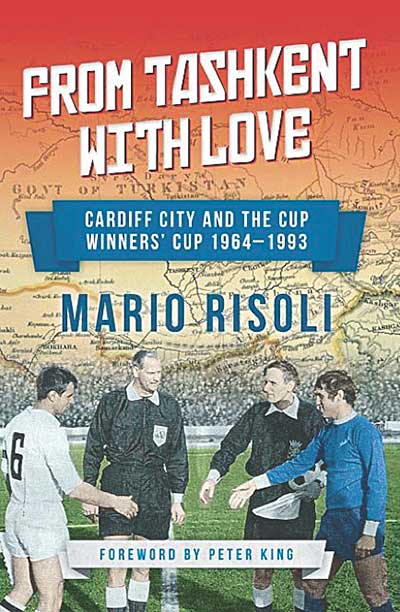 Cardiff City and the Cup Winners Cup 1964-1993
Cardiff City and the Cup Winners Cup 1964-1993
by Mario Risoli
St David’s Press, £16.99
Reviewed by Huw Richards
From WSC 338 April 2015
Collective memory tends to privilege the ancient and modern at the expense of what came in between. For Cardiff City the FA Cup win in 1927 looms with the same symbolic weight as 1966 does for England fans, while recent recall summons up unwanted red shirts, thwarted promotion campaigns and misery last season.
Mario Risoli, an expert preserver of Welsh football’s past, aims here to reclaim a time when Cardiff combined being a lower-division club at home with redoubtable warriors in Europe. It needed recovering. That these achievements were in a tournament which no longer exists, and enabled by a route Cardiff can no longer take – winning the Welsh Cup – cuts institutional continuities. And while the last venture was in 1993, the core of this history (and two thirds of its length) is contained in the years between 1964 and 1971.
Risoli draws on press archives and an outstanding collection of interviews with former players. They offer a vivid picture of European competition before it was subsumed to club business plans, as a glorious break from mundane reality and, in a less travelled age, a venture into the unknown.
Even that future footballing cosmopolite John Toshack could recall of the food in Tashkent in 1968: “It was like dog food. The only thing that we could eat were these big bread rolls. We called them discuses.” Entrepreneurial players took chocolates, ties and socks to sell in Moscow, only as Bobby Ferguson recalls: “We ended up eating most of the chocolate and giving the rest away because the people were so nice.”
Along with the tales of Cardiff stalwarts such as Peter King, who contributes a fine foreword, and Don Murray are glimpses of more widely remembered careers, bracketed by John Charles’s last great display at Sporting Lisbon in 1965 and Robbie James’s final senior goal, scored in defeat by Standard Liege in 1993. At the book’s heart is a compelling warts-and-all picture of Jimmy Scoular, Cardiff’s manager from 1964 to 1973 – so competitive he would kick players in a Friday afternoon five-a-side, given to tirades of abuse and arbitrary decisions and paranoid about all foreigners, yet still cherished by many of his players.
And the title gets it right. Beating Real Madrid 1-0 in 1971 is the most remembered achievement of this whole period. Yet the truly historic feat was the extraordinary expedition of 1968, passing through Breda, Moscow, Tashkent and Augsburg en route to a semi-final defeat by Hamburg which ranks for heartbreak alongside the missed penalty that cost Cardiff the League title in 1924. Risoli might perhaps have made more of fan memories and put his excellent game-by-game narration more into the wider context of the club’s history. There should certainly have been an index included. But with all that, he has produced both a great read and a real contribution to football’s collective memory.
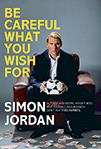 by Simon Jordan
by Simon Jordan
Yellow Jersey Press, £18.99
Reviewed by Matthew Barker
From WSC 306 August 2012
Simon Jordan has never been the easiest of people to warm to. The public perception has generally been that of a perma-tanned flash git and there is little in this book to suggest otherwise. However, plenty enjoyed those inspired rants in his short series of Observer columns (“If I see another David Gold interview on the poor East End Jewish boy done good I’ll impale myself on one of his dildos,” etc).
Anyone hoping for more of the same in this autobiography is going to be disappointed. Yes, there is some fun to be had here, but the prose can be so clunky at times, full of bland cliches and feeble geezerisms, that it is clear Jordan benefited from a decent sub-editor when it came to his newspaper work.
The arc of Jordan’s time at Selhurst Park encompasses some crucial moments, both for Crystal Palace and English football at large. Beginning with the failure of ITV Digital and ending with his club in administration nine years later, there is a simmering anger in these pages, erupting in a perfect storm after 2004’s promotion and Iain Dowie quitting after the traumas of the following season. The fallout was bitter. To prove a charge of fraudulent misrepresentation in the ensuing court case, investigators even seized the departed coach’s laptop.
Jordan is keen throughout to portray himself as the progressive young buck, kicking against the grey-haired, grey-suited establishment of club owners. Some of the promised score-settling turns out to be pretty tame. It is no great surprise that David Sullivan comes across as a nasty little man, making a point of loudly asking Jordan in the middle of the Birmingham boardroom if he was gay. The witty riposte – “Why? Do you fancy a crack at me?” – was equally crass.
Former Charlton chairman Richard Murray challenges Jordan to a fight after an invitation to lunch is turned down, while Steve Coppell, Peter Taylor and Trevor Francis are all portrayed as cheerless mopes of varying degrees. Steve Bruce, despite the whole gardening leave episode, remains “a firm friend”.
There is, as you might expect, a fair bit of bragging too. Our man flits between his “exclusive Chelsea penthouse suite” and Puerto Banus, living in a world full of “beautiful ladies”. Even more galling is his boasting about his friendship with former Wimbledon chairman Charles Koppel, a “close ally against all football bullshit”.
For all that, reading the final chapters, Jordan’s frustration and eventual weary resignation as he bemoans the grip of agents and watches as a succession of homegrown talent leaves the club, is palpable. The passages describing his attempts to avoid insolvency have a gripping inevitability; the sums of money quoted are startling and depressing. Jordan invested and lost a lot. And you have to feel for him.
Palace appear to have done better than most clubs after the shock of administration, but the game’s landscape continues to alter and present new challenges, with the Elite Player Performance Plan and Financial Fair Play both starting to kick in. Maybe Jordan should write a column about it.
